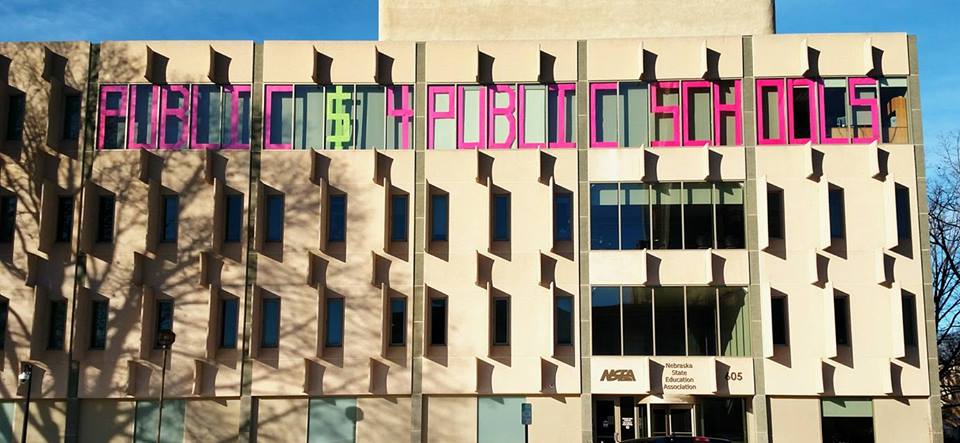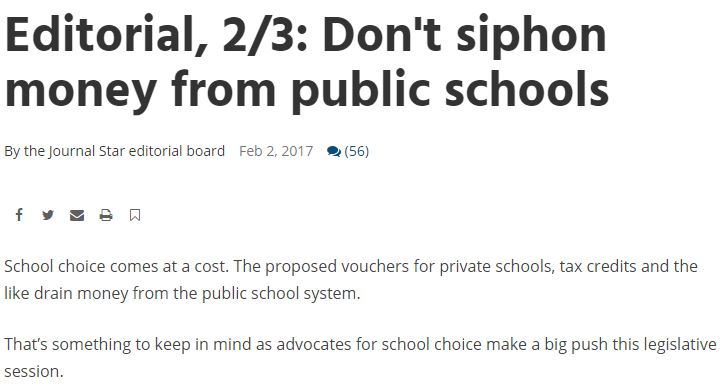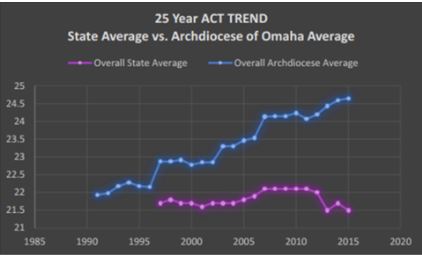|
BLOB [noun]: Big Learning Organization Bureaucracies What are tax-credit scholarships? And are they as nefarious as the Nebraska education establishment says they are? These are great questions in light of the fact that LB295 has advanced to the general file in 2018 and will be discussed on the floor of the Nebraska state legislature. Before we look at some of the fallacious rhetoric that has been put forth in the last few weeks, let’s look at the basics.
But there are many people in Nebraska who apparently don’t think our state should encourage private donors to give students more educational options. Here are some of the whoppers they're trotting out in order to prevent students from having more choices outside of the traditional public schools. “Tax-credit scholarships are tax breaks for the top 1%, handouts for the wealthy." In an attempt to leverage class warfare, this line of reasoning tries to make tax-credit scholarships look like a scheme (they even use the word “scheme”) to help the rich get richer. Until the tax credits are used up, anyone can apply. You don’t have to belong to the ever-changing, much-maligned top 1%, although the Buffetts could certainly apply if they wanted to. A tax credit simply reduces your overall tax liabilities. It doesn’t “give” you anything, so it can’t be called a handout. Your money either goes to the state along with the rest of your taxes, or it goes to a scholarship-granting organization. Either way, the taxpayer doesn’t get any sort of handout and doesn’t even get to keep any more of his or her money. We don’t hear anyone up in arms over the “1%” receiving handouts in the form of other Nebraska state tax credits such as the Microenterprise Tax Credit for small businesses in distressed areas, the Nebraska Historic Tax Credit for improvements on older homes, and the Nebraska Research and Development Act for businesses engaging in research. Perhaps the BLOB thinks business owners and old houses are more worthy of our attention and resources than children and their educations. More likely, however, they simply want to keep all of the state’s children in their monopoly, even if the monopoly isn’t effectively educating every child. “But tax-credit scholarships don’t help special needs students.” This is a red herring. There is nothing in the law that says special needs students are exempt from these scholarships. In fact, some tax-credit scholarship programs (GSNS in Georgia, the South Carolina Educational Credit for Exceptional Needs Children, and Gardiner Scholarship in Florida) are designed specifically for special needs students. It’s not realistic to expect the local public schools to be prepared and able to handle every special need; in fact, more Omaha special needs students might be able to attend the Madonna School for Exceptional Children and other similar private schools if they simply had scholarships to do so--the Madonna School already helps to educate some public school children whose needs are not met at their neighborhood public schools. Some private schools are especially adept at educating special needs students. Parents of special needs children know that the more options they have, the more likely they are to find the best fit for their kids. "Public money should not be used for private schools!” This is simply a misunderstanding of the law. With tax-credit scholarships, private donors give to scholarship-granting organizations, which in turn give the money to K-12 students to attend private schools of their choice. The public taxpayer funds collected for K-12 education are left untouched. With fewer children enrolled in the public schools, however, Nebraska taxpayers would save money, and this is very important given the fact that Nebraskans pay more in taxes than nearly everyone else in the country. In Florida, tax-credit scholarships save the state $1.49 for every $1 in lost revenue. Georgia’s tax-credit scholarships have saved the state between $12 million and $85 million. Michael Q. McShane puts it this way: “Fiscally, tax credit scholarships can be a win–win–win: a win for families who get financial support to choose the best option for their child’s education; a win for the state, which can provide these options at an extremely reasonable cost; and a win for local districts who can have more resources to devote to the children who choose to stay in their local public school.” “This is just an effort to save private schools. They need this to survive.” This argument does more to shine a light on the public school establishment’s thinking than it does on the school choice movement. The current public school model depends on taxes for its increased spending and large capital building projects. That’s why the establishment spends millions of dollars on campaigns to reassure the public that our public school systems are beyond reproach and don’t need improvements.
Private schools already exist in a landscape of competition. That’s why they’re able to educate students for much less than the public schools do. Competition breeds efficiency and improved outcomes. These scholarships are not about propping up a school system. Students can use their scholarships at any of the hundreds of Nebraska private schools they want to. If anything, competition among the private schools will increase, and that’s a good thing for parents and students. Listen carefully to the rhetoric around tax-credit scholarships. It’s easy to tell which people are concerned about students and which ones are concerned about the monopoly. As you can see from the examples above, the people opposing tax-credit scholarships rarely mention students or education. They’re too busy concerning themselves with class warfare, money, and control. If they really cared about the academic success of each and every child, wouldn’t they want all children--even those with no financial resources--to have every opportunity? And if not, why?
0 Comments
|
|








 RSS Feed
RSS Feed